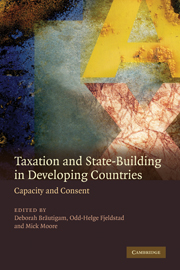Crossref Citations
This Book has been
cited by the following publications. This list is generated based on data provided by Crossref.
Bird, Richard M.
2008.
The BBLR Approach to Tax Reform in Emerging Countries.
SSRN Electronic Journal,
Robinson, Mark
2008.
Hybrid States: Globalisation and the Politics of State Capacity.
Political Studies,
Vol. 56,
Issue. 3,
p.
566.
Newell, Peter
2008.
CSR and the Limits of Capital.
Development and Change,
Vol. 39,
Issue. 6,
p.
1063.
Bird, Richard M.
2008.
Tax Challenges Facing Developing Countries.
SSRN Electronic Journal,
Bird, Richard M.
and
Zolt, Eric M.
2008.
Technology and Taxation in Developing Countries: From Hand to Mouse.
SSRN Electronic Journal,
Wong, R. Bin
2008.
Historical Lessons About Contemporary Social Welfare: Chinese Puzzles and Global Challenges.
SSRN Electronic Journal,
Unsworth, Sue
2009.
What's politics got to do with it?: Why donors find it so hard to come to terms with politics, and why this matters.
Journal of International Development,
Vol. 21,
Issue. 6,
p.
883.
Bird, Richard M.
2009.
Tax System Change and the Impact of Tax Research.
SSRN Electronic Journal,
Prichard, Wilson
and
Leonard, David K.
2010.
Does reliance on tax revenue build state capacity in sub-Saharan Africa?.
International Review of Administrative Sciences,
Vol. 76,
Issue. 4,
p.
653.
Barkin, David
and
Dayton Gunn, Hazel
2010.
Books Received.
Review of Radical Political Economics,
Vol. 42,
Issue. 1,
p.
121.
Prichard, Wilson
2010.
Taxation and State Building: Towards a Governance Focused Tax Reform Agenda.
IDS Working Papers,
Vol. 2010,
Issue. 341,
p.
01.
Lesage, Dries
McNair, David
and
Vermeiren, Mattias
2010.
From Monterrey to Doha: Taxation and Financing for Development.
Development Policy Review,
Vol. 28,
Issue. 2,
p.
155.
Eubank, Nicholas
2010.
Peace-Building Without External Assistance: Lessons from Somaliland.
SSRN Electronic Journal,
Prichard, Wilson
and
Leonard, David K.
2010.
La dépendance à l'égard des recettes fiscales renforce-t-elle les capacités de l'État en Afrique subsaharienne ?.
Revue Internationale des Sciences Administratives,
Vol. Vol. 76,
Issue. 4,
p.
687.
Gillies, Alexandra
2010.
Giving Money Away? The Politics of Direct Distribution in Resource Rich States.
SSRN Electronic Journal,
Everest‐Phillips, Max
2010.
State‐Building Taxation for Developing Countries: Principles for Reform.
Development Policy Review,
Vol. 28,
Issue. 1,
p.
75.
Di John, Jonathan
2010.
The Concept, Causes and Consequences of Failed States: A Critical Review of the Literature and Agenda for Research with Specific Reference to Sub-Saharan Africa.
The European Journal of Development Research,
Vol. 22,
Issue. 1,
p.
10.
Prichard, Wilson
2010.
Taxation and State Building: Towards a Governance Focused Tax Reform Agenda.
IDS Working Papers,
Vol. 2010,
Issue. 341,
p.
01.
Cammett, Melani Claire
and
MacLean, Lauren M.
2011.
Introduction: the Political Consequences of Non-state Social Welfare in the Global South.
Studies in Comparative International Development,
Vol. 46,
Issue. 1,
p.
1.
Moore, Mick
2011.
The Governance Agenda in Long Term Perspective: Globalisation, Revenues and the Differentiation of States.
IDS Working Papers,
Vol. 2011,
Issue. 378,
p.
1.





